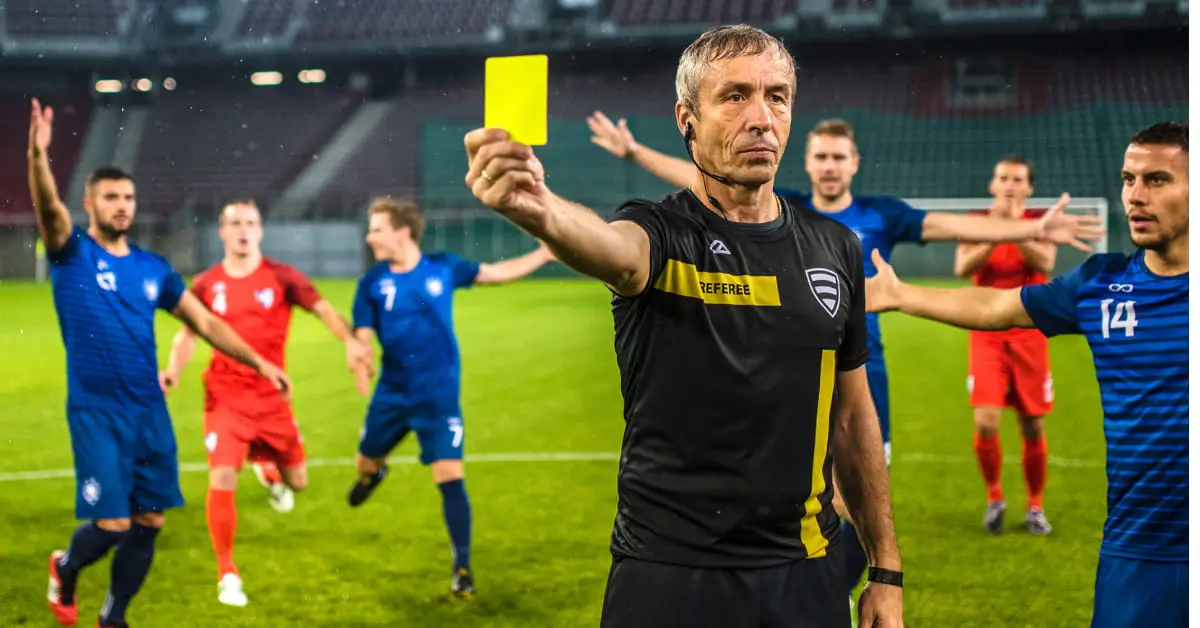Soccer is a game played by millions around the world. It’s been a part of our culture for over a century. It’s a game where skill and teamwork are highly valued. The rules of soccer are very simple; the goal is to score more goals than your opponents. The game consists of two teams, and each team has 11 players. The players on each team are divided into defense and offense. The goal is to score as many goals as possible, and the team with the most goals at the end wins the game. But what does it mean when you get a yellow card?
What does a yellow card mean in soccer?
Yellow cards are a common occurrence in soccer matches. They’re issued when a player commits an infraction of the rules, and they can be given for different reasons.
In general, yellow cards are given to players who commit fouls or other infractions of the rules. The referee may issue the card for minor offenses such as kicking the ball out of bounds or making an illegal substitution. It’s also possible to receive a card for dissent. This is when you argue with the referee about something that has happened during the game, or for excessive use of force in tackling or marking an opponent.
Yellow cards can be used to punish players who commit more serious offenses as well as those who commit less serious ones. For example, if a player kicks another player in retaliation for something that happened during play, then they might receive a yellow card even though they weren’t actually trying to hurt anyone else on purpose (they just wanted revenge).
In addition to being sanctioned by the referee issuing them during play, yellow cards can also be issued after matches have ended. These punishments come in two forms: suspension or fines.”
You may also watch this video:
Suspension
A suspension is a period of time during which a player is unable to participate in matches. Suspensions are usually issued in sets of two or three games depending on the severity of the offense.
The length of suspensions is determined by the referee, who will review the video evidence and decide whether or not to issue a suspension. If a player receives two yellow cards in consecutive matches, they may also be subject to an automatic suspension. A referee can also choose to levy an additional suspension if they feel that a player’s actions warrant it.”
Fines
Fines are monetary payments that must be made by players who have committed particularly egregious offenses (such as assault).
They are usually issued in conjunction with suspensions, and the amount of the fine is determined by a number of factors. Players may also be fined if they fail to show up for a game or if they leave an injured player on the field after being instructed to bring them off.
Managers and Coaches
Managers and Coaches Can Get Yellow Cards Too
It’s not just players who can get yellow cards. Managers and coaches can also be called for a foul when they enter the field of play without permission or throw anything onto the field.
In addition, managers and coaches can be penalized if they show dissent towards a referee’s decision. This includes gesturing with their arms in an aggressive manner or arguing with the official after a call has been made. If you’re going to argue with the ref, keep it brief and polite.
Type of fouls for a yellow card
There are many types of fouls for a yellow card, but they can be divided into three categories:
Offensive
Offensive fouls are those that occur during the act of attacking an opponent. The most common offensive foul is holding an opponent’s jersey or arms.
Offensive fouls can also include:
- Pushing an opponent
- Checking (or charging) an opponent with excessive force
- Or any kind of unsportsmanlike behavior directed at the referee, another player, or a member of the opposing team.
Defensive
Defensive fouls are those that occur during the play on defense. The most common defensive foul is tripping or kicking an opponent in order to stop his progress toward a goal. Although grabbing and holding him may also be considered a defensive foul if done at excessively close range or with excessive force.
Other Instances
Other instances where players can be called for defensive fouls include:
- Tackling an opponent from behind
- Hitting an opponent in the head with any part of your body except for your hands, arms, and shoulders
- Using your hand or arm to hold, push or impede an opponent who does not have possession of the ball
- Make contact with an opponent who does not have possession of the ball by using your hands or arms when both players are clearly outside the field.
The Consequence of Getting a Yellow Card
There are a number of consequences to getting a yellow card. Here are the most common:
- You will be given a free kick and be required to stand 10 yards away from the ball while your teammates place it on the penalty spot. This is called a “free kick.” You must remain at this distance until the referee whistles for play to begin again.
- The player receives a one-game suspension, It means that he or she cannot play in his team’s next match.
- If the player gets a second yellow card, he or she will be ejected from the match and serve a two-game suspension.
What happens if you get two yellow cards?
If you get two yellow cards, you’ll get a red one.
It’s pretty simple: if you get two yellow cards, the referee will give you a red card. This means that you are ejected from the game and can’t participate in any further play.
If this happens to you, don’t worry, it’s not permanent! Just remember what happened and learn from it so that it doesn’t happen again.
You can also try to talk with your coach about what went wrong. As a result, they can help you improve as a player.
If you get two yellow cards, you’ll also be suspended from your next game. This means that you won’t be able to play in it and will have to sit on the sidelines while your team continues without you.
However, If you get a red card, you’ll be suspended for more than one game. You won’t be able to play in your next match and also the one after that! This is why it’s important not to get too angry or upset when something happens on the field. It can have some serious consequences for your team.
What Referees Write on Yellow Cards
When you get a yellow card, the referee will write down your number and your team on the back of it. This is so that they can keep track of who gets one and make sure no one gets more than one at a time.
You should keep this information with you when playing so that you can avoid doing that action again! It’s important to remember that the referee may not always write on your yellow card. Sometimes he or she will just give it to you without writing anything on it.
If this happens, you should ask the referee what they wrote on your yellow card. This way you can make sure that you don’t do that action again!
How long does a yellow card last in soccer?
A yellow card is a warning issued by the referee to a player who has committed an offense. It is shown when a player commits a foul, and it’s accompanied by caution from the referee. The yellow card lasts for two minutes. During this time, the player must stay on the field but can’t participate in play until the two minutes have elapsed.
During this time, the player must remain on the field of play, but they are not allowed to participate in any activities related to playing soccer until their two-minute penalty has expired.
After the two minutes have passed, the player is allowed to participate in play again. If a player receives a second yellow card during their team’s next game, they are shown a red card and must be removed from the field of play.
Conclusion
A yellow card in soccer is a warning that the player has violated specific game rules. This usually results in a milder punishment than an actual red card, but it still requires that the player leave the field of play for a period of time. Players who receive multiple yellow cards during a game may be subject to suspension from future games. Overall, a yellow card is a minor disciplinary action that can have major consequences on the outcome of a match.




1 thought on “What Does a Yellow Card Mean in Soccer?”